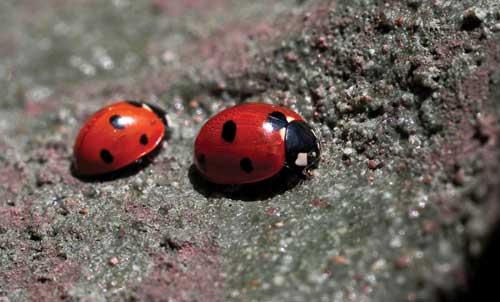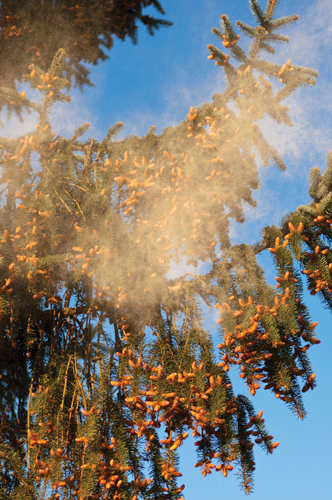
On a summer hike to the disturbingly named Grave Creek in western Montana, the nearer I draw toward the summit, the steeper and slower the going gets. The boulders are immense—room-sized—and an intriguing verse in the Bible comes to mind: “In my Father’s house are many mansions.”
Maybe it’s just the translation, but I’ve never thought that sentence was meant to convey “My old man is an opulent dude, he lives in a big house, you should join his religion, it comes with lots of schwag.” A common interpretation holds that the statement suggests there are different ways to inhabit that mansion and that there is no shortage of availability. But like all great metaphors, it surely encompasses other layers, meanings, and discoveries.
The room-sized boulders here, too, are lichen-encrusted; they haven’t burned off in a while. There’s an old, boarded-up fire lookout on the very top, a place that exudes an extreme loneliness when I reach it.
The wind is fierce today. I look down at all the lesser ridges—their seemingly endless ocean-waves scrolling back to the east, rolling toward the jagged peaks of the back side of the Bitterroots—and as the wind increases, I see an amazing thing.
Plumes of yellow pollen, behaving exactly like smoke, are racing north in serpentine rivers, rising from the bouncing limbs of every pine tree. It looks exactly as if every north-south-running ridge has burst into flame, and even though I know it’s pollen—that the forests that cling to the thin skin of the mountains are being reborn—the visual registry of it stirs the archetypal neural paths of fear that were once upon a time etched so deeply within us. Maybe I’m actually in the safest place there is, looking down on everything else, but it still arouses a prickle of discomfort. It looks as if I’m looking down upon a sea of fire.

It’s the oNorway spruce (Piceabies) showing pollination as it blows in the wind in the UKne day of the year where the pollen, heat-riven, is most ready to be windswept. How many other precision-point moments are there in this ecosystem that appear year after year, cycle after cycle? Are there such points, such swings and shifts and turns, in our own lives?
It’s a breathless kind of energy, the way the wind hurries the pollen-smoke straight up some ridges, while it curls in more leisurely eddies around others. It looks as if the pace of the world has quickened today, and for some reason, mesmerized though I am, I want to look away: it’s too fast.
It’s so big, this display of the vast garden of these western pine forests, so robustly fertilizing themselves—bypassing the subtleties and intricacies of the more considered insect pollinators. Some of these forests will succumb to mortality, courtesy of the drilling of bark beetles, whose wind-aided flights are likely following the same golden paths of the rushing rivers of pollen I’m watching below.
There’s not much room for lounging on top of Grave Creek: squat lookout cabin occupies all of the limited flat space; I have to catwalk my way around it to keep from falling off the top of the mountain in order to reach the talus up which I climbed. The view of the mountain, and from the mountain, would be better, in my opinion, without this boarded-up old house here.
In my Father’s mansion are many rooms. It could mean just about anything.
As I had suspected, the north slope is steep and still sheeted with snow and ice; not even on skis would I attempt such a descent—my hoped-for shortcut—yet neither do I wish to backtrack over country I’ve just already passed through. So I start back down the south slope, picking a random angle to follow, not really paying close attention to the terrain beyond, but instead just putting one step in front of the next, and trusting that the descent will take care of itself.
Carefully, I pick my way down through the massive rocks, each fractured and ragged and coated with crunchy black lichens. After only a few steps I see an orange ladybug crawling across one of the boulders. I stop, as charmed by the sight now as I was as a child. And as I am watching it, I spy another, seemingly following the first ladybug’s trail, and, changing my focus slightly, I realize that there are ladybugs everywhere, that they’re coming out from beneath the rocks, that they are about to take flight, as the day warms: that I’m sitting in the midst of a phenomenon, a miracle.
I sit there for a long time, watching them as if viewing traffic on some mountain interstate from forty thousand feet above. Who made the ladybugs of the world, and why are they orange, and why do they have those black dots? I can’t remember. I assume it’s a protective mechanism, a kind of pollination-day’s camouflage, but they are colorful all year long. Maybe they spend their resources, their species’ plan, protecting themselves on the one day when they most need to be protected, and when the world of pollen and pollination—the waiting green breath of plants or forests—most needs them.
I watch the little universe below me for quite a while, but I am made a little nervous, wondering the whole time,How am I going to get off these rocks without crushing them all? I imagine that as the day warms, more and more of the bugs will emerge from the cracks and fissures—it seems to me that the blossoming is just beginning and that there will only be more, an effusive outpouring of bounty—and that with each step I will be at risk of destroying entire legions of the miracle.
Studying my route carefully, choosing each step one at a time, trying to avoid touching a single ladybug, I wander carefully through the black rocks, a giant playing a ridiculous game of Twister, until finally I am out of their territory, and with all souls intact, not a single one harmed.
Do other things pass through a fragile world with this same curious mix of caution and consideration for the lesser things, and yet also sometimes with reckless zeal? It seems hard to imagine that such a mix exists only within us, in such a large and interconnected world. It came from somewhere, and it is hard to imagine it ever going away.